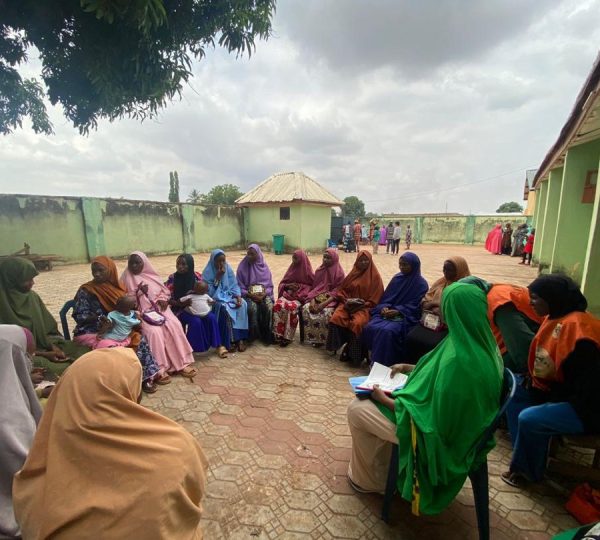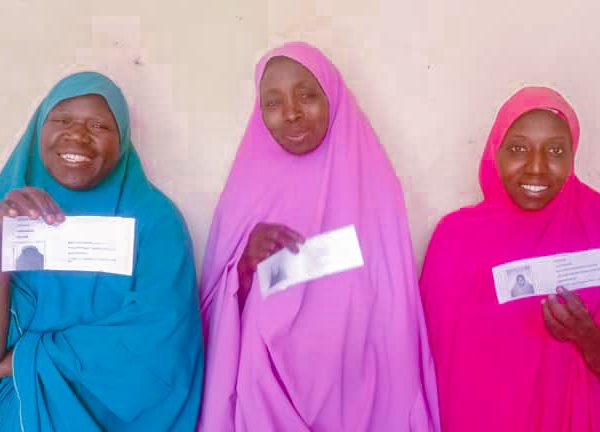Kaduna State LLIN Campaign Successes – Beyond Malaria
The Kaduna State Long Lasting Insecticide Treated Net (LLIN) campaign was indeed successful – almost all households in the state received mosquito nets. Community workers who participated in the LLIN distribution believed the campaign platform could be leveraged in the conduct of a population census, elections or vice versa as well as scaled to provide universal health coverage for households in communities.
The LLIN campaign also brought locals who were previously unaware of and did not utilise the services provided by healthcare facilities located within their communities into these health facilities to receive LLINs and in addition request for additional free health services. The use of health facilities as LLIN distribution points was strategic and consequently improved healthcare facility usage including skilled birth attendance in Kaduna State.
Grace Otuga, the Officer-In-Charge (OIC) at the Primary Healthcare Facility in Kaduna North Local Government (LG) and the town announcer of that distribution point were emphatic that the number of patients who report in the PHC for malaria treatment have reduced significantly since the distribution of mosquito nets commenced. Although, it is too short a time to witness substantial impact, reviews of the PHC client records post the LLIN campaign and preceding months should clarify this claim. It is worthy to add that the LLIN campaign has put the health facilities on a good platform to continue provision of health education that should enhance utilization of LLINs in the State.
In addition to households education on the proper use of LLINs and the benefits of LLIN use to household health and finances, households also learned to clean and care for their environments in order to curb the breeding of mosquitoes and other disease-causing pathogens. More residents of Kaduna State are aware of the effectiveness of LLINs in malaria prevention as well as the proper methods to use and maintain LLINs as a result of the GF Malaria net campaign. Beneficiaries were guided on the best methods to wash their nets and dispose the nets eventually. This, we see as a first step in the drive towards behaviour change for malaria elimination in Kaduna. The recruited health educators were local health practitioners whose roles it was to improve knowledge of malaria and related disease prevention. Heath educators also used the opportunity of the net distribution and access to households to campaign for polio eradication and immunization of children. There was significant collaboration between the malaria and polio programs – joint flag off and same staff were used. There is also the possibility of utilizing integrated messaging and data across the two programs. Educators and members of the team also gained people management skills in the process of the exercise.
The LLIN campaign tried to alleviate poverty as a source of employment for locals especially unemployed youths and the retired elderly. Over 25,000 locals were employed and involved in the Kaduna State LLIN campaign. These locals were employed as household mobilizers, town announcers, independent monitors, supervisors, local government storekeepers, store securities, conveyors and LLIN distribution point (DP) team members for the period of the LLIN campaign (59 days). They were able to earn in monetary terms during this time. Additionally, the capacities of all employed personnel were strengthened in the use of basic health system and mass net campaign tools. The employees use of technology for data collection in this net campaign is an acquired skill that will become relevant in future mass surveys that increasingly now require the use of mobile technology.

The campaign in addition, promoted financial inclusion. Ownership of a bank account was a prerequisite to participation in the LLIN campaign. This inspired the first-time creation of bank accounts by a substantial number of locals for the sole purpose of gainful employment and transparent, prompt receipt of payments from the implementing partners. For example, the ward supervisor of Kaduna North LGA divulged to us how his wife opened a bank account for the first time ever as a result of the GF Malaria LLIN campaign in Kaduna State. Actually, ownership of one bank account inspired her to open a second account.
Our interview with the Civil Society Organisation (CSO) – Global Initiative for Women and Children (GIWA) also revealed more non-health successes achieved as a result of the campaign exercise in Kaduna State.
GIWA was sub-contracted by Society for Family Health (SFH) to implement key community mobilization activities in Zaria. SFH engaged with twenty-three (23) CSOs, one per LGA for community mobilization.
In an interview with Aminu Babangida, Programme Officer, GIWA, Aminu told our team that the Emir of Zazzau Emirate Council which covers seven (7) LGAs out of the States 23 LGAs, donated an office in Zaria to GIWA to facilitate the CSOs activities in Zaria beyond the GF Malaria LLIN campaign. For the first time, GIWA has an office structure in Zaria from where it can implement its many demand creation activities for different health and development sector projects in that locality.
As a result of SFH and GIWAs efforts during this GF Malaria LLIN campaign, all ward heads in Zaria came out in their multitudes to support the LLIN distribution. Also, women in purdah were easily accessible for the first time in Zaria and could receive the distributed nets from distributors. Consequently, GIWA reached more households than it was expected to reach and the campaign further strengthened GIWAs reputation and acceptability in Zaria and Kaduna state, strenghtening their capacity to implement similar interventions on future donor funded projects.
For sustainability of the campaign achievements, GIWA promises to continue to implement the LLIN campaigns demand creation and behavioural change communication (BCC) activities in Zaria beyond the GF LLIN campaign timeframe. GIWA will sustain the successes of the campaign by integrating malaria messaging into its other health and development messaging and interactions with households, traditional and religious leaders (TRLs), health facilities, and the primary healthcare development agency (PHCDA). It will also be integrating malaria prevention messaging into messaging provided at community life events such as weddings, birthdays and other ceremonies. The CSO intends to continue to ensure that households are hanging their received nets post-LLIN campaign completion. This robust approach to sustain gains after the LLIN campaign exercise is likely to be effective if scaled across all 23 LGAs in Kaduna state by other CSOs.
Our work with CSOs
It became necessary to bring CSOs on board because of their operational structures and closeness to the communities. CSOs are usually engaged through the three phases of LLIN campaigns: Pre-campaign, Campaign and Post-campaign.
In the pre-campaign and campaign phases, CSOs are expected to conduct six (6) different activities per ward in their respective LGAs in order to mobilize beneficiaries and community people at large. The targeted result is to ensure that household mobilizers meet beneficiaries at home during house-to-house mobilization (pre-campaign phase) as well as mobilize beneficiaries to the distribution points to redeem their mosquito nets with the issued LLIN cards (during the LLIN campaign).
These activities are meant to sensitize, stimulate, educate and create the necessary awareness and high demand for the commodity (LLIN). The activities are but not limited to road shows, drama presentation, town announcements, town hall meetings, community dialogues with stakeholders, and visits to religious institutions.
During the third or last phase of CSOs engagement (post campaign), CSOs are expected to visit a minimum of ten (10) households per ward to ensure that beneficiaries are using and hanging their received mosquito nets correctly. CSO staff are then to provide support in cases where LLINs are hung or used wrongly. CSOs are provided funds to make work easy and smooth at the community level i.e. the sum of N5,500 per activity. Case in point, the LLIN campaign strengthened the Civil Society for Malaria Control, Immunization and Nutrition (ACOMIN) members capacity, funding and motivation to deliver strategic behaviour change communication. As a result, ACOMIN members are up and about running through the communities with the messages of LLIN use.
Moreover, beyond the LLIN campaign engagement period, and as part of their core responsibilities, CSOs are expected to constantly use their already existing structures in communities to propagate and advocate for a positive LLIN use culture which will at the end, improve people’s lives.





